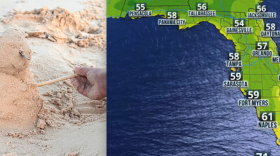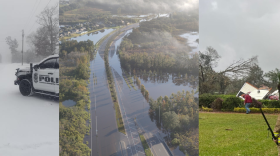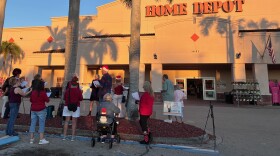TALLAHASSEE --- A controversial proposal designed to prevent homeless people from sleeping in public places while requiring local governments to address the issue is headed to Gov. Ron DeSantis.
The Republican-controlled Senate on Tuesday voted 27-12 along party lines to pass the bill (HB 1365), which would bar cities and counties from allowing people to sleep at places such as public buildings and in public rights of way. The House approved the bill last week, and DeSantis has voiced support for it.
Senate sponsor Jonathan Martin, R-Fort Myers, said the goal is to provide safer locations for people than sleeping at places such as parks or under overpasses and pavilions.
“Insufficient shelter beds and insufficient permanent housing solutions result in unsheltered sleeping and camping in public places, places that we want our kids and grandkids to enjoy, like the parks,” Martin said. “This bill is a compassionate response to the shortage of shelters and supportive housing by providing an alternative to sleeping in the streets.”
But Democrats argued the state would provide limited resources to local governments to carry out the measure, potentially exposing the local governments to lawsuits.
Sen. Shevrin Jones, D-Miami Gardens, said the measure is “literally reshuffling the visibility of unhoused individuals with no exit strategy for people who are experiencing homelessness.”
“I understand that this bill does not make it illegal for people to sleep in public places,” Jones said. “But rather, it appears to make it illegal for local governments to ignore people sleeping in public.”
The measure would allow local governments to designate certain property for sleeping or camping if the sites meet standards set by the Florida Department of Children and Families.
Such areas, which could only be used for one year, would have to include access to such things as restrooms and running water, have security and be deemed alcohol- and drug-free. Also, the sites could not harm values of nearby properties or safety.
The bill would give residents and business owners standing to file civil lawsuits against local governments for allowing illegal sleeping or camping on public property.
Fiscally constrained counties --- mostly rural counties --- would be exempted from certain requirements if complying would create a financial hardship.
Sen. Jason Pizzo, D-Sunny Isles Beach, said the bill isn’t designed to solve homelessness, but to clean streets of a “nuisance.”
“When you say that Jefferson County will not have to provide behavioral health services to this, but in Broward County you will, you don't really mean it that you're trying to help all those people,” Pizzo said, referring to rural Jefferson County being fiscally constrained.
Sen. Geraldine Thompson, D-Windermere, said costs for local governments could top $500 million and cautioned that the planned “encampments have the potential to increase human trafficking.”
Sen. Rosalind Osgood, a Fort Lauderdale Democrat who was once homeless, said the approach would create greater mistrust between people experiencing homelessness and law enforcement and could divide communities.
Martin said a $117.46 billion state budget, which lawmakers are expected to pass Friday, includes $30 million in challenge grants for local governments to provide mental-health and substance-abuse services, short-term and traditional shelters and sanctioned camping and safe-harbor sites.
In February, DeSantis pointed to homeless problems in San Francisco as he expressed support for legislative efforts to provide “some support for counties for additional sheltering, providing some financial support for both substance-abuse (programs) and mental health.”
“What we don't want to see in the legislation is any incentive to create homeless camps, particularly in areas that would interfere with the public conducting normal business,” DeSantis said during a Feb. 5 news conference in Miami Beach.







